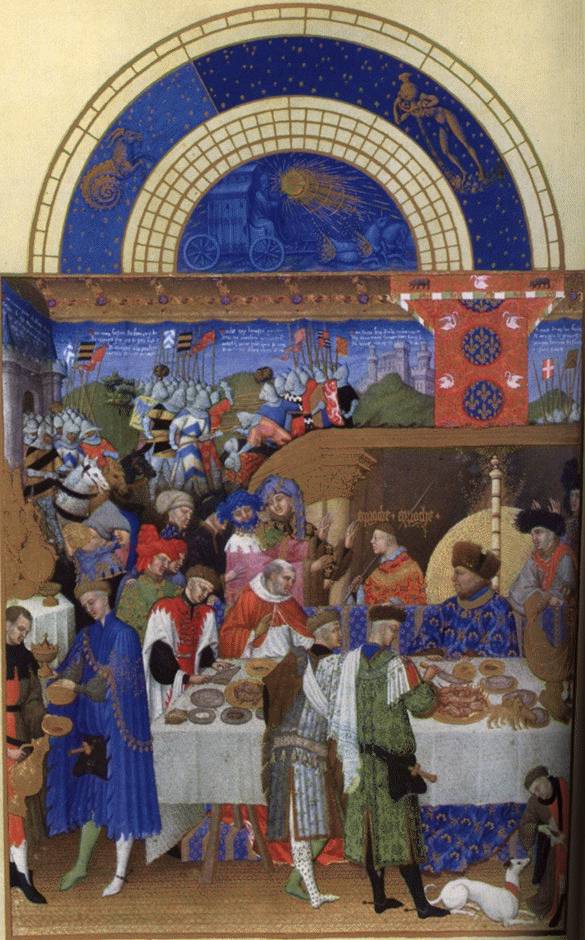 Before talking about how Sir Gawain and the Green Knight came to my aid following Justin’s death, let me go through it (for those of you haven’t read it or haven’t read it recently), focusing especially on the way it handles the topic of death. The poem is in the top five of my “favorite works of all time.” I love its matter-of-fact magic and its deft comic touch. The fact that it handles death in a good-humored way is extraordinary given that it was written towards the end of the 14th century. The 14th century, after all, was one of the most disastrous centuries in history. It witnessed, first of all, the black plague (1348-50), which wiped out a third (!!) of Europe’s population. It also experienced the beginning of the Hundred Year’s War and, in England, a bloody peasant uprising. Not a good time.
Before talking about how Sir Gawain and the Green Knight came to my aid following Justin’s death, let me go through it (for those of you haven’t read it or haven’t read it recently), focusing especially on the way it handles the topic of death. The poem is in the top five of my “favorite works of all time.” I love its matter-of-fact magic and its deft comic touch. The fact that it handles death in a good-humored way is extraordinary given that it was written towards the end of the 14th century. The 14th century, after all, was one of the most disastrous centuries in history. It witnessed, first of all, the black plague (1348-50), which wiped out a third (!!) of Europe’s population. It also experienced the beginning of the Hundred Year’s War and, in England, a bloody peasant uprising. Not a good time.
Written around 1385, Sir Gawain and the Green Knight is about a man who discovers that he has a year left to live. That’s because Gawain (in this story he is Arthur’s premier knight) has accepted the beheading challenge of a green giant, who has ridden into Camelot during the Christmas revels and offered an exchange of axe blows. After receiving Gawain’s blow and retrieving his head, the knight tells Gawain to meet him at “the green chapel” in a year’s time (January 1 or so). Gawain is pretty sure he will not survive the return blow.
Nevertheless, when the time comes he shrugs off any show of concern and rides off to find the green chapel, which is somewhere in the wilderness (probably Wales). After several weeks of hard riding and hard fighting (with bears, gibbering giants, and “wild men of the rocks”), he is hopelessly lost and close to despair. He prays for divine aid and, at that moment, he sees a magnificent castle. He is welcomed and feted by Lord Bertilak and his beautiful wife. Bertilak assures him that the green chapel is close by and, as the appointment is a few days off, Gawain is invited to rest and relax until then.
Bertilak also offers him a game. He and his men will go out hunting while Gawain is enjoined to take it easy. At the end of each day, the two men will exchange their winnings. Over the next three days Bertilak engages in three vigorous hunts and succeeds in slaying several deer, a boar, and a fox. Gawain, meanwhile, finds himself being seduced by Lady Bertilak. The poem makes it fairly clear that he, too, is the target of a hunt. His problem is that, although he is sworn to chastity and honor, he also cannot (as a chivalrous knight) refuse a lady’s request. He must, therefore, refuse without seeming to refuse, which he does through very circuitous means.
In the end, he accepts three kisses, which he bestows without explaining upon his host (in exchange for the carcasses) at the end of each of the three days. He does not, however, reveal that, on the last day, he also accepts a magic girdle from the lady, which she claims will save his life. In other words, he does not entirely keep to the rules of the contract he has made with his host.
On the appointed day Gawain rides off to the green chapel, which proves to be a wilderness mound, and faces the green knight. The knight twice feints with the axe, driving Gawain nuts, and when he finally brings it down, he barely knicks him. At this point Gawain figures that he has filled his end of the bargain and leaps up, only to discover the green giant laughing at him. He comes to learn that the green giant is actually Lord Bertilak and that he knows about the green girdle that Gawain is secretly wearing. The whole castle interlude has been a test of some kind. Gawain thinks he has failed but Bertilak thinks he has done pretty well. Gawain returns to Camelot, tells the story to the court, and Arthur and all of Camelot agree to don green ribbons in remembrance of the event. While Gawain is hard on himself for his behavior, everyone else sees him as a hero.
I will explore in up-coming entries how this poem helped me during the grieving period over Justin and how it is helping me currently with a friend of mine who is battling with terminal cancer.

